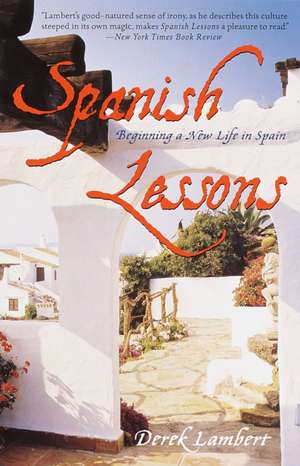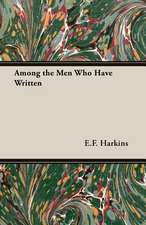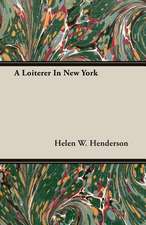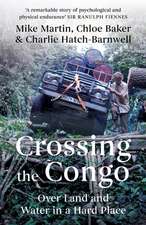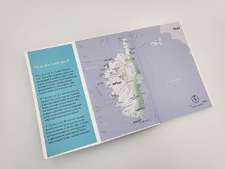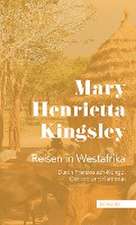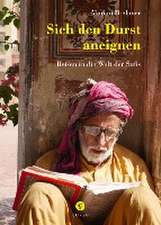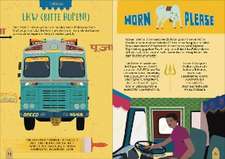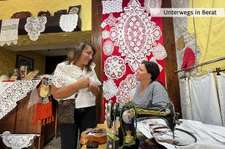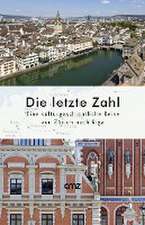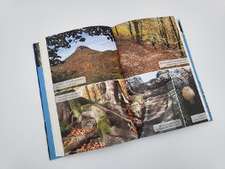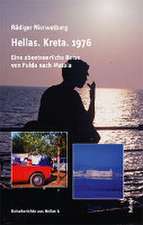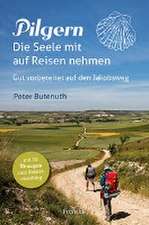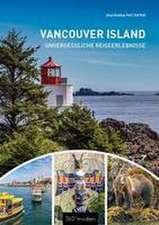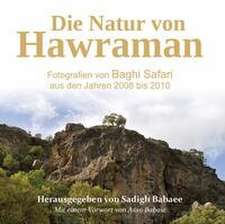Spanish Lessons: Beginning a New Life in Spain
Autor Derek Lamberten Limba Engleză Paperback – 2 iul 2001
As Lambert and his wife set about restoring their moldering casita on Spain’s Mediterranean Costa Blanca and learning to live the life of Spanish villagers, he introduces us to a nation far removed from the matadors, tapas bars, and sangria swillers. He uncovers the “real” Spain–a nation of passionate, eccentric, often contradictory, but always enchanting people. Unpredictable, often hilarious, and animated by colorful characters, Spanish Lessons presents an intimate and delightful portrait of off-the-tourist-track Spain.
Preț: 106.23 lei
Nou
Puncte Express: 159
Preț estimativ în valută:
20.33€ • 21.28$ • 16.92£
20.33€ • 21.28$ • 16.92£
Carte disponibilă
Livrare economică 10-24 martie
Preluare comenzi: 021 569.72.76
Specificații
ISBN-13: 9780767904162
ISBN-10: 0767904168
Pagini: 272
Dimensiuni: 133 x 204 x 23 mm
Greutate: 0.22 kg
Editura: Crown Publishing Group
Colecția Broadway Books
ISBN-10: 0767904168
Pagini: 272
Dimensiuni: 133 x 204 x 23 mm
Greutate: 0.22 kg
Editura: Crown Publishing Group
Colecția Broadway Books
Notă biografică
Derek Lambert has contributed to newspapers and magazines worldwide. He is also the author of several novels. He lives in the province of Alicante, Spain with his wife and son.
From the Hardcover edition.
From the Hardcover edition.
Extras
ONE
A Taste of Oranges
The two civil guards wore black tricorn hats, capes, and olive-green uniforms. And although mounted on angular bicycles, they looked as sinister as their predecessors had in the civil war that tore Spain apart in the 1930s.
It was late December, and the citrus trees that covered most of the plain separating the Mediterranean from the mountains on the Costa Blanca of Spain were heavy with oranges, lemons, and grapefruit. The trees looked so beguiling that Diane and I stole a couple of oranges. We were eating them, juice trickling down our chins, in our venerable, chocolate-brown Jaguar, when the two Guardia Civil stopped beside us.
Maybe pinching oranges was a heinous crime in Spain. Tales were still rife after the death of the dictator General Francisco Franco of foreigners being imprisoned for years without trial for unspecified offenses. I imagined us lying on straw mattresses in fetid cells miles apart, while rats snatched food from our eating bowls.
Or perhaps we would be deported and declared persona non grata, a preferable scenario but nonetheless depressing, because it would mean that the vision we had shared when we first met in Africa would be aborted before it even got off the ground.
Diane, a Canadian airline stewardess with blond hair and eyes the color of the sea before a storm, had told me on our first date in Nairobi that having experienced a couple of scary landings, she wanted to quit flying and start a new life. So did I. I was a journalist in my forties, a foreign correspondent, and I wanted to become a novelist: our meeting was convened by the gods.
But supposing the gods had now turned against us, snitched on us to the Guardia . . .
Diane offered the two of them a brilliant, please-fasten-your-seatbelt smile while I stuffed incriminating orange peel into a plastic bag. "What can we do for you?" she asked. She had been brought up in Paris and Rome, had studied Spanish, and in any case picked up languages as easily as children catch measles.
One of the Guardia, young with a downy mustache, dis-mounted. "Are you lost?" he asked in English, peering into the aristocratic but doddery old Jaguar as I tried to back-heel the plastic bag under the driver's seat.
"No," Diane said, "we're just admiring the view."
It was worth admiring. Lizard-gray mountains on one side of the citrus plantations, the sea beckoning in the cold sunlight on the other. Here and there a field of leafless grapevines; almond and olive trees and carobs with trunks like fairytale witches.
The Guardia, who seemed to have exhausted his English, produced a creased booklet from beneath his cape and read from it: "I am so pleased you are admiring our territory."
Diane tried a few phrases in Valenciano, the regional language that confuses tourists who have studied orthodox Spanish, but he held up one hand and again consulted his phrase book. "Please, I do not understand, I am from the north." His colleague, a sad-looking cabo, a corporal, who looked like a long-ago Hollywood actor, Adolph Menjou, joined him.
"Do you have any papers?" he asked—"papers," a disturbingly general term that could embrace anything from a visa to a last will and testament.
Diane told him in English: "We might settle in the area."
True enough—we were looking for a village so ordinary that it would bring us into contact with people remote from the clichŽs of Spain—flamenco, sangria, and bullfights—and would define the changes that had taken place since Franco's death in 1975, so that I could write about them one day.
Her statement perturbed the cabo. He spoke with one hand, flapping and clenching it. Endless complications, his hand said. Bureaucracy, papers . . .
Diane searched for some sort of ID in the chaotic contents of her purse. Ballpoint pens, lipsticks, coins, a comb, a chocolate bar . . . The cabo suggested that we get out of the car. A preliminary to being frisked, handcuffed?
Diane found her passport and handed it to him. Fishing rights in international waters hadn't yet exacerbated relations between the two countries, and a Canadian passport still commanded respect. He flicked through it, handed it back, and saluted.
He stabbed a finger toward me. "Your husband does not speak too much."
Conceding that Diane was better at placating irate policemen, I had kept out of it. Not only that; she was much more fluent in Spanish than I was, and although I was studying manfully I preferred to converse in English even with any Spaniards who spoke only on the level of "Me Tarzan, you Jane."
"He's very shy," Diane said, and burst into helpless laughter. Reticence had never been my strong suit.
The younger officer, thinking perhaps that she was weeping, laid a hand on her shoulder. The cabo, suspecting that he was in the presence of an unstable neurotic woman and a deaf-mute, took a step back.
"In the orchards," he said in English, "one person one orange is allowed. More"—he cut across his throat with one finger. "If you want to eat a good meal this place is very pleasing." He handed Diane a grubby visiting card and both men pedaled away, capes flowing behind them.
We embraced, our visions of a home here still intact. We drove to a village perched in the hills and gazed beyond the citrus trees to the sea, fishing boats perched on its rim. The church clock tolled and the chimes rang through narrow streets that smelled of whitewash and grilling sardines. Hunger stirred. We each drank a glass of rough wine in a bar so dark that I couldn't tell whether I was being served by a man or a woman—at five pesetas a glass, who cared?—and headed for the restaurant recommended by the cabo. In my experience, policemen anywhere in the world knew the best establishments in which to take on ballast.
When we reached the address on the card, a shack with a cane roof beside a sandy beach ankle deep in seaweed, it was shut. We decided to hang around. After a while a door opened, a bead curtain parted, and a woman in black, wearing slippers, bunched cheeks squeezing her eyes, confronted us.
What did we want? She had already paid her rent and she didn't want to buy a carpet or an encyclopedia from traveling salesmen, her tone implied.
"We're very hungry," Diane said in English.
The woman's face softened. The period after the Civil War and World War II, when Spain was ostracized by much of the world because it was ruled by Fascists, was known as the Years of Hunger.
"Are you American?" she asked Diane. So many families had fled to the United States and Britain after the Civil War ended in 1939 that, happily for me, a grasp of English was not uncommon.
"Canadian."
The woman shrugged. What mattered was that we were foreigners and could not be turned away. "The restaurant is closed for the winter," she said. "But I can give you lamb chops and rice." My stomach whined.
After she had poured us a pitcher of beer at the bar, she rolled up the slatted blinds. Sunshine lit a faded photograph of a football team and a statue of a madonna with a chipped face. A skinny black cat wrapped itself around my legs. White plastic tables and chairs covered with a patina of dust stood where they had been abandoned at the end of summer.
As the smell of the chops grilling reached us, an orchestra played in my stomach and I drowned it with beer.
Watched through slitted yellow eyes by the cat, a canary sang in a cage.
The woman placed hunks of toasted bread on the table and we fell on them, spreading them with alioli, a thick sauce made from pounded garlic cloves, egg yolks, olive oil, and lemon juice.
Faintly we heard the swish of modest waves unfurling on the seaweed.
After we had wolfed the chops and saffron-yellow rice, she served coffee and walnut cake.
Then a middle-aged man appeared in the kitchen doorway behind the bar. He looked familiar. "It was good?" he asked.
His voice sounded familiar, too.
As we nodded vigorously, the woman said: "This is my husband, Pepe. He is a cabo in the Guardia."
And suddenly I realized that the corporal who had stopped us was a man of parts. Policeman, tout for his own restaurant, and chef.
I peered into the kitchen: the Guardia with the downy mustache was peeling potatoes, presumably for a private meal.
Pepe winked and began to clear our table. Diane and I ex-changed glances. Such devious charm was difficult to resist.
We paid the bill, linked hands, and walked toward the Jaguar. An old man wearing a hat with spaniel ears was collecting firewood on the beach; gulls floated on the milky sea; behind us the mountains were beginning to retreat into the winter night.
We found the rest of the walnut cake on a paper plate in the front of the car. I squeezed Diane's hand. She squeezed back. Without speaking, we knew we were in the area to stay.
We found the sort of unassuming village we were looking for inland from the apartment blocks, hotels, and beaches of the Costa Blanca, the White Coast. It didn't possess any historic landmarks, unless you counted the bubble-blowing public wash house; no castanets clicking, not a pitcher of sangria in sight.
Located at sea level deep inside the citrus groves halfway down the Mediterranean coast, La Jara was equidistant from the cities of Valencia to the north and Alicante to the south, sixty miles or so either way.
We came across it by chance when our decrepit car broke down with a sigh and a hiss on the road skirting its boundaries. It had transported us in its dotage across France from England and limped around Spain for five days while we inspected prospective homes.
While a mechanic in a small garage coated with black grease examined its engine, we wandered around streets lined with nondescript terraces of whitewashed cottages and hole-in-the-wall stores. The streets were flat and paved, and yet I imagined them in a turn-of-the-century painting, rutted with mud. Perhaps it was because the people seemed still to be lodged in that epoch, scowling women in darned black dresses, men wearing collarless shirts and tight jackets, faces engraved by sun and wind.
What we didn't yet know was that on the outside, Spanish villages smile only in the mornings and evenings and we had arrived just before lunch. Inside, they laugh most of the time.
We found seven bars, a church with a spire like a space rocket, an open-air cinema, four groceries, a bank, three hairdressing salons, a school, and a combined newsstand and tobacco shop becalmed in eternal dusk. All this for a population of one thousand.
But the village possessed a few delicate attributes as well, brass door knockers polished wafer thin, courtyards where old ladies in the ubiquitous black weaved lampshades, roses painted on ceramic tiles outside doorways to keep summer a prisoner of winter.
Finally we adjourned to the Bar Paraiso into a wall of noise—the steamy roar of a coffee machine, the bark of impassioned debate over coffees and brandy, tobacco coughs, the smack of dominoes on plastic tabletops.
A dusting of last night's cigarette ash lay on the pool table, which bore a stain the shape of Australia. A diminutive barman was fanning a smoldering vine root in the grate. The hands of a wall clock that, we discovered later, occasionally went backward, stuttered erratically.
We ordered a couple of beers and sat at a table. We were joined by a balding priest, his soutane hemmed with dust, and a carpenter who said: "My name is Emilio."
Emilio had arms as thick as most people's thighs, curly hair threaded with silver, and a voice as rough as the rasp of a saw. Like many Spaniards whose families had fled to the United States in 1939—he had been born there and didn't need any prompting to volunteer his family history—he spoke English with an American accent.
His father had reopened the family's toy factory in the nearby town of Denia when he came back from New York, but the market for wooden toys had declined and he had retired. Emilio had been left to make doors, window frames, and coffins in an annex here in the village.
"Are you going to settle here?" he asked. When we said we might, he thumped the table with a mallet fist. "Let me be the first to congratulate you. I know just the place for you to buy."
I assessed him cautiously: in my experience, back-slapping extroverts were often con men, and I'd learned to be wary of the twinkling gaze, the knuckle-crunching handshake. But Emilio's hustling was so outrageously transparent that it was disarming.
"First," I told him, "we'll look around by ourselves."
He nodded understandingly. "In your position I'd do the same. But it doesn't matter, because nothing you'll see will compare with the property I will show you. It only came on the market this morning, God must have guided you to me."
We adjourned with Emilio to the garage to find out what was happening to the Jaguar. Its body was raised on a ramp; parts of its engine lay on the greasy floor like the components of a stripped gun.
A voice issued from the pit. We were lucky: the fault had been located. "When will it be ready?" I asked.
"Ma-ana"—tomorrow. A bowlegged mechanic, his cherubic face daubed with oil, climbed out of the pit. Meanwhile, he could lend us a Seat 600, Spain's ubiquitous little workhorse in the 1970s.
We left Emilio behind and drove the car, little more than a battered toy, to the village bakery, where we bought four big crusty rolls for bocadillos, jaw-straining sandwiches stuffed with fillings such as tuna, cheese, chorizo (a relative of salami), or ham. In a grocery we bought Manchego cheese, strong as saddle soap, smoked ham, tomatoes and olive oil, plastic knives, forks, and cups, and a bottle of red wine from Navarra.
The purchase of these small items made us feel proprietorial toward the village, like pioneers in an undiscovered outpost.
We drove along a dirt road to a clearing in a citrus grove where orange pickers had left the remains of a fire, the hub of their almuerzo, their mid-morning snack. We stirred the still-hot ash and pale flames danced in the embers. Diane slit open the rolls, spread them with olive oil, and crammed them with cheese and sliced tomatoes.
On one side of us, grapefruit lay rotting on the red earth beneath the trees, no longer a fashionable fruit, we had been told.
A Taste of Oranges
The two civil guards wore black tricorn hats, capes, and olive-green uniforms. And although mounted on angular bicycles, they looked as sinister as their predecessors had in the civil war that tore Spain apart in the 1930s.
It was late December, and the citrus trees that covered most of the plain separating the Mediterranean from the mountains on the Costa Blanca of Spain were heavy with oranges, lemons, and grapefruit. The trees looked so beguiling that Diane and I stole a couple of oranges. We were eating them, juice trickling down our chins, in our venerable, chocolate-brown Jaguar, when the two Guardia Civil stopped beside us.
Maybe pinching oranges was a heinous crime in Spain. Tales were still rife after the death of the dictator General Francisco Franco of foreigners being imprisoned for years without trial for unspecified offenses. I imagined us lying on straw mattresses in fetid cells miles apart, while rats snatched food from our eating bowls.
Or perhaps we would be deported and declared persona non grata, a preferable scenario but nonetheless depressing, because it would mean that the vision we had shared when we first met in Africa would be aborted before it even got off the ground.
Diane, a Canadian airline stewardess with blond hair and eyes the color of the sea before a storm, had told me on our first date in Nairobi that having experienced a couple of scary landings, she wanted to quit flying and start a new life. So did I. I was a journalist in my forties, a foreign correspondent, and I wanted to become a novelist: our meeting was convened by the gods.
But supposing the gods had now turned against us, snitched on us to the Guardia . . .
Diane offered the two of them a brilliant, please-fasten-your-seatbelt smile while I stuffed incriminating orange peel into a plastic bag. "What can we do for you?" she asked. She had been brought up in Paris and Rome, had studied Spanish, and in any case picked up languages as easily as children catch measles.
One of the Guardia, young with a downy mustache, dis-mounted. "Are you lost?" he asked in English, peering into the aristocratic but doddery old Jaguar as I tried to back-heel the plastic bag under the driver's seat.
"No," Diane said, "we're just admiring the view."
It was worth admiring. Lizard-gray mountains on one side of the citrus plantations, the sea beckoning in the cold sunlight on the other. Here and there a field of leafless grapevines; almond and olive trees and carobs with trunks like fairytale witches.
The Guardia, who seemed to have exhausted his English, produced a creased booklet from beneath his cape and read from it: "I am so pleased you are admiring our territory."
Diane tried a few phrases in Valenciano, the regional language that confuses tourists who have studied orthodox Spanish, but he held up one hand and again consulted his phrase book. "Please, I do not understand, I am from the north." His colleague, a sad-looking cabo, a corporal, who looked like a long-ago Hollywood actor, Adolph Menjou, joined him.
"Do you have any papers?" he asked—"papers," a disturbingly general term that could embrace anything from a visa to a last will and testament.
Diane told him in English: "We might settle in the area."
True enough—we were looking for a village so ordinary that it would bring us into contact with people remote from the clichŽs of Spain—flamenco, sangria, and bullfights—and would define the changes that had taken place since Franco's death in 1975, so that I could write about them one day.
Her statement perturbed the cabo. He spoke with one hand, flapping and clenching it. Endless complications, his hand said. Bureaucracy, papers . . .
Diane searched for some sort of ID in the chaotic contents of her purse. Ballpoint pens, lipsticks, coins, a comb, a chocolate bar . . . The cabo suggested that we get out of the car. A preliminary to being frisked, handcuffed?
Diane found her passport and handed it to him. Fishing rights in international waters hadn't yet exacerbated relations between the two countries, and a Canadian passport still commanded respect. He flicked through it, handed it back, and saluted.
He stabbed a finger toward me. "Your husband does not speak too much."
Conceding that Diane was better at placating irate policemen, I had kept out of it. Not only that; she was much more fluent in Spanish than I was, and although I was studying manfully I preferred to converse in English even with any Spaniards who spoke only on the level of "Me Tarzan, you Jane."
"He's very shy," Diane said, and burst into helpless laughter. Reticence had never been my strong suit.
The younger officer, thinking perhaps that she was weeping, laid a hand on her shoulder. The cabo, suspecting that he was in the presence of an unstable neurotic woman and a deaf-mute, took a step back.
"In the orchards," he said in English, "one person one orange is allowed. More"—he cut across his throat with one finger. "If you want to eat a good meal this place is very pleasing." He handed Diane a grubby visiting card and both men pedaled away, capes flowing behind them.
We embraced, our visions of a home here still intact. We drove to a village perched in the hills and gazed beyond the citrus trees to the sea, fishing boats perched on its rim. The church clock tolled and the chimes rang through narrow streets that smelled of whitewash and grilling sardines. Hunger stirred. We each drank a glass of rough wine in a bar so dark that I couldn't tell whether I was being served by a man or a woman—at five pesetas a glass, who cared?—and headed for the restaurant recommended by the cabo. In my experience, policemen anywhere in the world knew the best establishments in which to take on ballast.
When we reached the address on the card, a shack with a cane roof beside a sandy beach ankle deep in seaweed, it was shut. We decided to hang around. After a while a door opened, a bead curtain parted, and a woman in black, wearing slippers, bunched cheeks squeezing her eyes, confronted us.
What did we want? She had already paid her rent and she didn't want to buy a carpet or an encyclopedia from traveling salesmen, her tone implied.
"We're very hungry," Diane said in English.
The woman's face softened. The period after the Civil War and World War II, when Spain was ostracized by much of the world because it was ruled by Fascists, was known as the Years of Hunger.
"Are you American?" she asked Diane. So many families had fled to the United States and Britain after the Civil War ended in 1939 that, happily for me, a grasp of English was not uncommon.
"Canadian."
The woman shrugged. What mattered was that we were foreigners and could not be turned away. "The restaurant is closed for the winter," she said. "But I can give you lamb chops and rice." My stomach whined.
After she had poured us a pitcher of beer at the bar, she rolled up the slatted blinds. Sunshine lit a faded photograph of a football team and a statue of a madonna with a chipped face. A skinny black cat wrapped itself around my legs. White plastic tables and chairs covered with a patina of dust stood where they had been abandoned at the end of summer.
As the smell of the chops grilling reached us, an orchestra played in my stomach and I drowned it with beer.
Watched through slitted yellow eyes by the cat, a canary sang in a cage.
The woman placed hunks of toasted bread on the table and we fell on them, spreading them with alioli, a thick sauce made from pounded garlic cloves, egg yolks, olive oil, and lemon juice.
Faintly we heard the swish of modest waves unfurling on the seaweed.
After we had wolfed the chops and saffron-yellow rice, she served coffee and walnut cake.
Then a middle-aged man appeared in the kitchen doorway behind the bar. He looked familiar. "It was good?" he asked.
His voice sounded familiar, too.
As we nodded vigorously, the woman said: "This is my husband, Pepe. He is a cabo in the Guardia."
And suddenly I realized that the corporal who had stopped us was a man of parts. Policeman, tout for his own restaurant, and chef.
I peered into the kitchen: the Guardia with the downy mustache was peeling potatoes, presumably for a private meal.
Pepe winked and began to clear our table. Diane and I ex-changed glances. Such devious charm was difficult to resist.
We paid the bill, linked hands, and walked toward the Jaguar. An old man wearing a hat with spaniel ears was collecting firewood on the beach; gulls floated on the milky sea; behind us the mountains were beginning to retreat into the winter night.
We found the rest of the walnut cake on a paper plate in the front of the car. I squeezed Diane's hand. She squeezed back. Without speaking, we knew we were in the area to stay.
We found the sort of unassuming village we were looking for inland from the apartment blocks, hotels, and beaches of the Costa Blanca, the White Coast. It didn't possess any historic landmarks, unless you counted the bubble-blowing public wash house; no castanets clicking, not a pitcher of sangria in sight.
Located at sea level deep inside the citrus groves halfway down the Mediterranean coast, La Jara was equidistant from the cities of Valencia to the north and Alicante to the south, sixty miles or so either way.
We came across it by chance when our decrepit car broke down with a sigh and a hiss on the road skirting its boundaries. It had transported us in its dotage across France from England and limped around Spain for five days while we inspected prospective homes.
While a mechanic in a small garage coated with black grease examined its engine, we wandered around streets lined with nondescript terraces of whitewashed cottages and hole-in-the-wall stores. The streets were flat and paved, and yet I imagined them in a turn-of-the-century painting, rutted with mud. Perhaps it was because the people seemed still to be lodged in that epoch, scowling women in darned black dresses, men wearing collarless shirts and tight jackets, faces engraved by sun and wind.
What we didn't yet know was that on the outside, Spanish villages smile only in the mornings and evenings and we had arrived just before lunch. Inside, they laugh most of the time.
We found seven bars, a church with a spire like a space rocket, an open-air cinema, four groceries, a bank, three hairdressing salons, a school, and a combined newsstand and tobacco shop becalmed in eternal dusk. All this for a population of one thousand.
But the village possessed a few delicate attributes as well, brass door knockers polished wafer thin, courtyards where old ladies in the ubiquitous black weaved lampshades, roses painted on ceramic tiles outside doorways to keep summer a prisoner of winter.
Finally we adjourned to the Bar Paraiso into a wall of noise—the steamy roar of a coffee machine, the bark of impassioned debate over coffees and brandy, tobacco coughs, the smack of dominoes on plastic tabletops.
A dusting of last night's cigarette ash lay on the pool table, which bore a stain the shape of Australia. A diminutive barman was fanning a smoldering vine root in the grate. The hands of a wall clock that, we discovered later, occasionally went backward, stuttered erratically.
We ordered a couple of beers and sat at a table. We were joined by a balding priest, his soutane hemmed with dust, and a carpenter who said: "My name is Emilio."
Emilio had arms as thick as most people's thighs, curly hair threaded with silver, and a voice as rough as the rasp of a saw. Like many Spaniards whose families had fled to the United States in 1939—he had been born there and didn't need any prompting to volunteer his family history—he spoke English with an American accent.
His father had reopened the family's toy factory in the nearby town of Denia when he came back from New York, but the market for wooden toys had declined and he had retired. Emilio had been left to make doors, window frames, and coffins in an annex here in the village.
"Are you going to settle here?" he asked. When we said we might, he thumped the table with a mallet fist. "Let me be the first to congratulate you. I know just the place for you to buy."
I assessed him cautiously: in my experience, back-slapping extroverts were often con men, and I'd learned to be wary of the twinkling gaze, the knuckle-crunching handshake. But Emilio's hustling was so outrageously transparent that it was disarming.
"First," I told him, "we'll look around by ourselves."
He nodded understandingly. "In your position I'd do the same. But it doesn't matter, because nothing you'll see will compare with the property I will show you. It only came on the market this morning, God must have guided you to me."
We adjourned with Emilio to the garage to find out what was happening to the Jaguar. Its body was raised on a ramp; parts of its engine lay on the greasy floor like the components of a stripped gun.
A voice issued from the pit. We were lucky: the fault had been located. "When will it be ready?" I asked.
"Ma-ana"—tomorrow. A bowlegged mechanic, his cherubic face daubed with oil, climbed out of the pit. Meanwhile, he could lend us a Seat 600, Spain's ubiquitous little workhorse in the 1970s.
We left Emilio behind and drove the car, little more than a battered toy, to the village bakery, where we bought four big crusty rolls for bocadillos, jaw-straining sandwiches stuffed with fillings such as tuna, cheese, chorizo (a relative of salami), or ham. In a grocery we bought Manchego cheese, strong as saddle soap, smoked ham, tomatoes and olive oil, plastic knives, forks, and cups, and a bottle of red wine from Navarra.
The purchase of these small items made us feel proprietorial toward the village, like pioneers in an undiscovered outpost.
We drove along a dirt road to a clearing in a citrus grove where orange pickers had left the remains of a fire, the hub of their almuerzo, their mid-morning snack. We stirred the still-hot ash and pale flames danced in the embers. Diane slit open the rolls, spread them with olive oil, and crammed them with cheese and sliced tomatoes.
On one side of us, grapefruit lay rotting on the red earth beneath the trees, no longer a fashionable fruit, we had been told.
Recenzii
“Lambert makes for an affable companion as we follow his first tentative days in a new country. It’s an entertaining yarn, and for anyone with a love for Spain and Spanish culture, an essential item to add to your bookshelf.” –Chicago Tribune
“In the tradition of A Year in Provence and Under the Tuscan Sun, [Derek Lambert] provides vivid descriptions of an entirely unique cultural landscape. [A] delightfully wry narrative…chock —full of breathtaking comical escapades and authentically colorful characters, this affectionately humorous memoir will appeal to both seasoned and armchair travelers.” –Booklist
“In the tradition of A Year in Provence and Under the Tuscan Sun, [Derek Lambert] provides vivid descriptions of an entirely unique cultural landscape. [A] delightfully wry narrative…chock —full of breathtaking comical escapades and authentically colorful characters, this affectionately humorous memoir will appeal to both seasoned and armchair travelers.” –Booklist
Descriere
Foreign correspondent Derek Lambert settles down in Spain and recounts his first year with overwhelming affection for the country and its people, with an eye for the distinctive traits of Spanish village life. A delightful portrait of off-the-tourist-track Spain.
